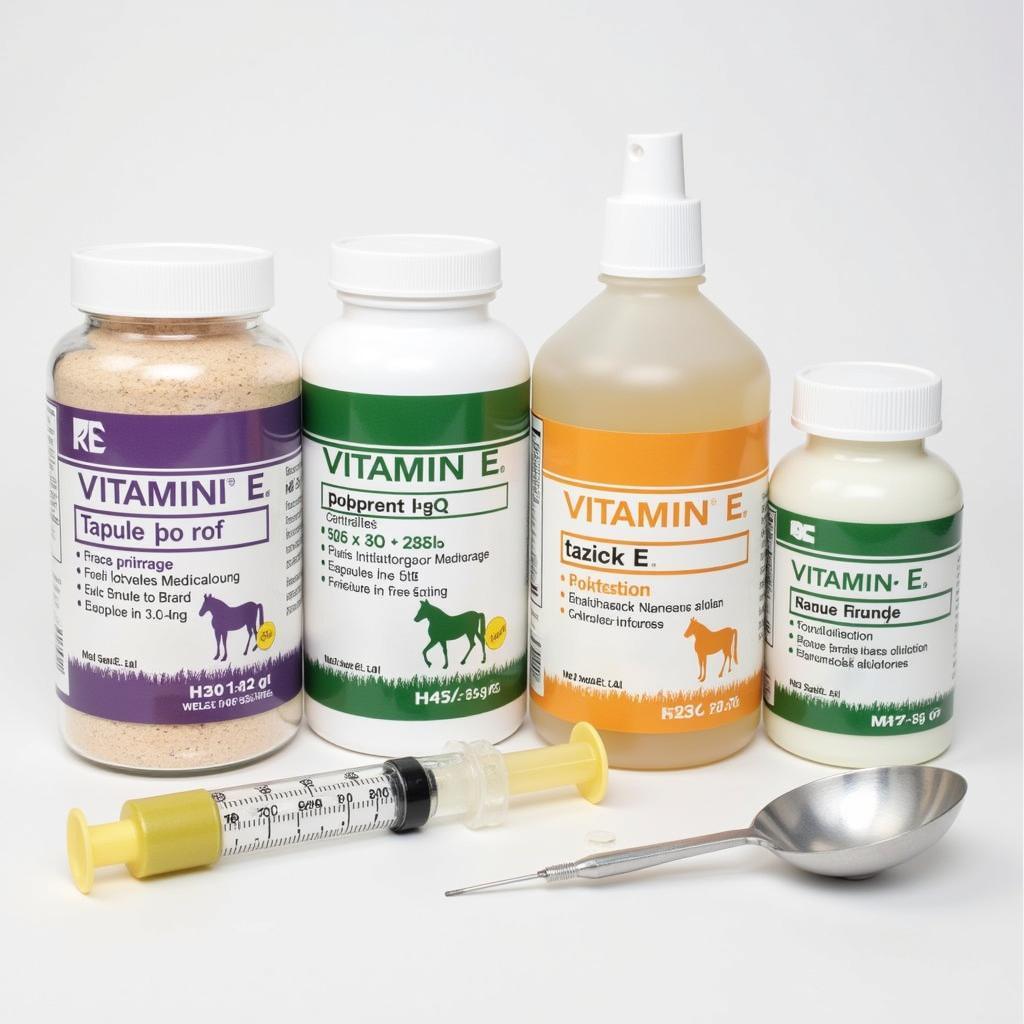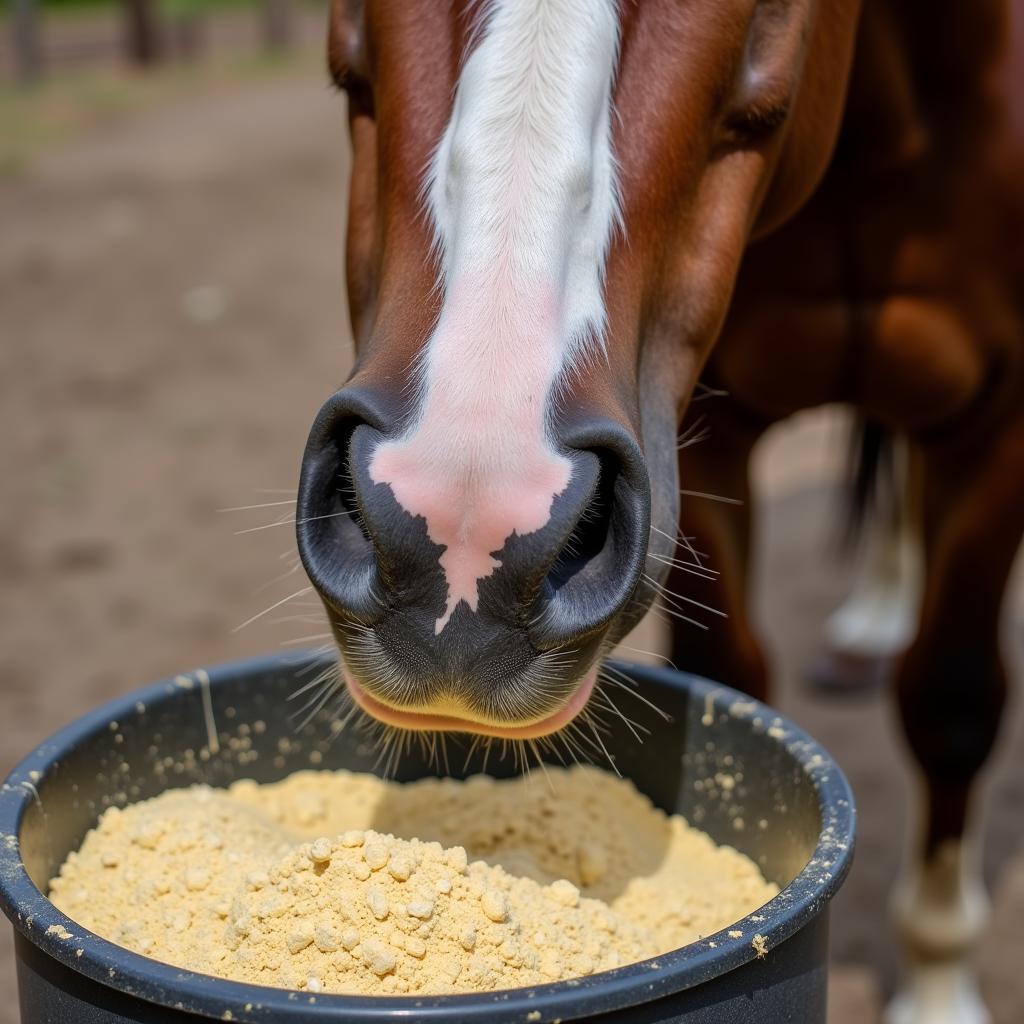Vitamin E is an essential nutrient for horses, playing a crucial role in maintaining their overall health, especially muscle function, immune system, and reproductive health. A common dosage being researched is 5000 IU. This article will delve into the benefits, dosage recommendations, potential risks, and best practices for supplementing your horse with 5000 IU of vitamin E.
Understanding the Importance of Vitamin E for Horses
Vitamin E is a powerful antioxidant that protects cells from damage caused by free radicals. These unstable molecules can contribute to various health problems in horses. Vitamin E also plays a vital role in nerve and muscle function, immune system support, and reproductive health. Deficiencies can lead to a range of issues, including muscle weakness, neurological problems, and impaired fertility. Knowing whether your horse needs supplementation, and at what dosage, is crucial for their well-being.
Benefits of Vitamin E Supplementation
Supplementing your horse with the correct amount of vitamin E can provide numerous benefits, including:
- Improved Muscle Function: Vitamin E helps protect muscle cells from oxidative stress, improving muscle strength, endurance, and recovery.
- Enhanced Immune System: A strong immune system is essential for warding off infections and diseases. Vitamin E supports immune function by enhancing the activity of white blood cells.
- Healthy Reproduction: Vitamin E plays a crucial role in reproductive health, particularly in stallions and pregnant mares. It can improve sperm quality and support fetal development.
- Neurological Health: Vitamin E protects nerve cells from damage, helping to maintain proper neurological function and prevent conditions like equine motor neuron disease (EMND).
Determining the Right Dosage of 5000 IU Vitamin E
While 5000 IU is a commonly researched dosage, it’s crucial to consult with your veterinarian before starting any supplementation. They can assess your horse’s individual needs based on factors such as age, activity level, diet, and overall health. Over-supplementation can be harmful, so it’s always best to follow a veterinarian’s guidance.
“Determining the appropriate vitamin E dosage should always involve a veterinarian. They can accurately assess your horse’s specific needs and prevent potential complications from over-supplementation,” advises Dr. Emily Carter, DVM, specializing in Equine Nutrition.
Administering Vitamin E to Your Horse
Vitamin E supplements for horses are available in various forms, including powders, capsules, and injectable solutions. The most appropriate form will depend on your horse’s individual needs and preferences. Your veterinarian can recommend the best option for your horse.
Choosing the Right Vitamin E Supplement
When choosing a vitamin E supplement, look for high-quality products from reputable brands. The label should clearly state the amount of vitamin E per serving, as well as any other ingredients. Natural forms of vitamin E, such as d-alpha-tocopherol, are generally preferred over synthetic forms.
 Different types of Vitamin E supplements for horses
Different types of Vitamin E supplements for horses
Monitoring Your Horse for Potential Side Effects
While vitamin E is generally safe for horses, some individuals may experience mild side effects, such as diarrhea or skin reactions. If you notice any unusual symptoms, discontinue supplementation and consult your veterinarian.
“While rare, side effects can occur. Regular monitoring and open communication with your veterinarian are key to ensuring your horse’s safety and well-being,” says Dr. Sarah Miller, PhD, Equine Nutritionist.
5000 IU Vitamin E for Horses: A Recap
Providing your horse with the right amount of vitamin E is crucial for maintaining their health and well-being. While 5000 IU is a researched dosage, remember to consult with your veterinarian before starting any supplementation program. They can help you determine the appropriate dosage and monitor your horse for any potential issues. By working closely with your veterinarian and following best practices, you can ensure your horse receives the optimal vitamin E intake for optimal health.
 Horse being given a vitamin e supplement
Horse being given a vitamin e supplement
FAQ
- What are the signs of vitamin E deficiency in horses?
- Can I give my horse human vitamin E supplements?
- How do I store vitamin E supplements for my horse?
- What other nutrients are important for my horse’s muscle health?
- How can I test my horse for vitamin E deficiency?
- Are there any interactions between vitamin E and other medications?
- Can I overdose my horse on vitamin E?
For any further questions or personalized advice, please contact us: Phone: 0772127271, Email: [email protected] or visit our location at QGM2+WX2, Vị Trung, Vị Thuỷ, Hậu Giang, Việt Nam. Our customer service team is available 24/7 to assist you.